Music biz hopes to profit from consumer content
By allohah
@allohah (52)
Philippines
January 2, 2007 9:45pm CST
LOS ANGELES (Billboard) - If 2006 was the year of user-generated content, 2007 will be the year the music industry learns to generate new revenue from the hugely popular trend.
Labels are striking licensing deals with sites like YouTube so that fans can post copyrighted content or include it in videos they make themselves. Additionally, labels are expected to start releasing new types of content -- such as unused clips or video montages -- specifically created for fans to manipulate in new ways.
By doing so, record labels can then share in the advertising revenue these sites collect. Rather than just suing YouTube and its ilk for how their sites are used, the music industry can now profit from them, not to mention reap the promotional benefits."They're doing it anyway," says Ted Cohen, former EMI Music Group digital executive and now founding partner of consulting firm TAG Strategic. "There's a chance to monetize this behavior."Additionally, music companies have the chance to let their fans actually sell music to one another via playlist-sharing services and peer-recommendation sites. Word-of-mouth marketing is exploding online through user-generated activity, creating a new generation of tastemakers. How well labels tap this effective source of music discovery will be a barometer of their overall digital strategies.
Here are five technologies shaping this space:SNOCAP
Launched with much fanfare in 2005, SnoCap has generated little momentum to date. But after scoring a big win with MySpace, which selected it to power its digital music service, 2007 could be SnoCap's year. The company's audio fingerprinting technologies -- as well as those from Audible Magic and Gracenote -- will play a key role in monetizing user-generated content by shifting the burden of acquiring licenses for copyrighted works from the end user to the service provider. Each time a fan uploads a copyrighted track, for whatever purpose, the technology notes who owns the rights, which ad is on the page hosting the content and how much the service provider is then owed.
BRIGHTCOVE
Another method of monetizing existing behavior, Brightcove works with content owners like Warner Music Group to make videoclips available to fans wishing to post content on their blog or Web site. Its embedded video technology then tracks how many times a given clip is viewed and compensates rights holders via its advertising platform. With broadband now in 80% of U.S. Internet households, analysts expect video to be the most important form of online media next year.
VENICE PROJECT
Analyst group In-Stat predicts that the Venice Project's peer-to-peer video project will be "the big viral media sensation of 2007." Founded by the brains behind Kazaa and Skype -- Janus Friis and Niklas Zennstrom -- the service uses P2P technology to distribute video a la BitTorrent, but also lets users modify the content within the rules that copyright holders set in advance. Unlike Kazaa, the Venice Project is built from the get-go with a business model and respect for copyrights, and already has attracted Paramount Pictures, MTV Networks, Twentieth Century Fox Film and Warner Bros. Home Entertainment to the fold.
ILIKE
iLike is one of several taste-matching sites designed to offer music recommendations by comparing the musical preferences of members and matching those with similar interests. The sites' social-networking aspect provides a human element to counter competitors that rely too heavily on algorithms, and iLike's integration of Apple's iTunes music service sets it apart from the pack. None of these music-discovery services -- others include Last.fm, MOG and Mercora -- actually sell music themselves, instead linking to other services and often not taking a cut. But Ticketmaster's mid-December 25% investment in iLike illustrates how digital retailers and other music interests will seek to either partner or acquire such sites to better-link the discovery process with a sale.
PASSALONG
Peer-retailing services like PassAlong reward users for the sale of each digital track they recommend to friends. So far such services haven't been a big hit. But PassAlong's answer has been to branch out with applications like OnTour, which notify users when any artist in their digital music library is scheduled to appear in their town. As more social networks follow MySpace's lead and enter the digital music retail game, peer retailers like PassAlong, Weedshare and Peer Impact will become ripe for acquisition.
No responses





